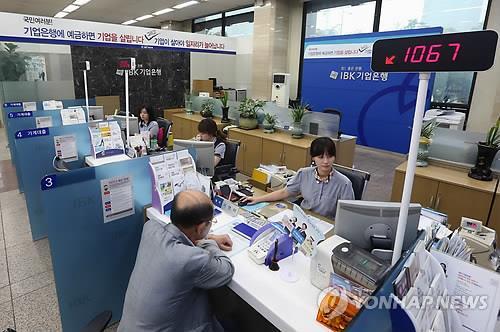The Ministry of Strategy and Finance and the Bank of Korea will inject 12 trillion won ($10 billion) both directly and indirectly via a fund into policy banks to finance the restructuring of debt-laden shipping and shipbuilding companies.
Finance Minister Yoo Il-ho said Wednesday that the government and the central bank have agreed to pursue restructuring through a mix of fiscal and monetary measures, adding that BOK will provide 10 trillion won as a loan to the Industrial Bank of Korea.

With the 10 trillion won, IBK will also additionally provide 1 trillion won to Korea Asset Management Corp., which will use the 11 trillion won to set up a fund to recapitalize the Korea Development Bank and Export-Import Bank of Korea. The 11 trillion won fund will invest in contingent convertible notes, or CoCo bonds, of KDB and Eximbank.
The government will seek to boost the capital base of Eximbank by handing over state-owned equities worth 1 trillion won to the bank to boost its capital base.
“We calculated that the policy banks will need an injection of around 5 to 8 trillion won should future circumstances involving restructuring worsen,” Yoo told reporters.
“The government will provide 1 trillion won to Eximbank by September, and devise next year’s budget by taking into account the needs for bank recapitalization.”
Yoo added that if the country fails to restructure the industries in time like it did in the 1990s, the market will again experience “pain” similar to the Asian financial crisis.
The Finance Ministry has also agreed with the central bank to safeguard BOK’s 10 trillion-won loan, noting that the government will guarantee that the central bank will be the first to retrieve all of its capital used for bank recapitalization. The BOK monetary policymaking committee is expected to finalize this decision on the 10 trillion won injection, according to the central bank.
The government’s 1 trillion won for Eximbank is part of efforts to keep the bank’s capital adequacy ratio over 10 percent. The bank’s BIS ratio currently stands at 9.9 percent, while that of KDB is at 14.6 percent, according to the Finance Ministry.
Korea will manage the fund until the end of 2017.
“From now on, the economic-related ministerial meetings will serve as a ‘control tower’ handling the financial affairs involving corporate restructuring and industry overhauls,” Yoo said.
“It would be insufficient to overcome external and internal (economic) factors with policies alone. The time calls for total reform.”
As shipping and shipbuilding companies unveiled their self-rehabilitation plans, the finance minister said that the government will increase the oversight of their finances and see whether the companies are properly implementing them with their creditors.
Korea’s big three shipyards -- Hyundai Heavy Industries, Samsung Heavy Industries and Daewoo Shipbuilding and Marine Engineering -- will seek to raise 10.3 trillion won through self-rescue plans, according to the Finance Ministry.
Hyundai Heavy Industries said it will secure 3.5 trillion won by selling off its three financial arms, including HI Investment & Securities, and reducing its headcount. It also plans to gradually stop operating its three docks and sell off the facilities.
Its main creditor KEB Hana Bank said the self-help plan is appropriate as the company is securing lower-than-expected orders.
Samsung Heavy Industries will also try to secure liquidity worth 1.5 trillion won by selling its non-core assets and idle production facilities. Although the volume is small, its creditors will review whether its plan is adequate.
Daewoo Shipbuilding said its additional self-rehabilitation plan includes securing 3.5 trillion won, following its earlier plan to secure liquidity worth 1.8 trillion won in October. It will reduce the number of docks from seven to five and sell off all of its 14 subsidiaries to secure cash and pay down its debt.
By Park Hyong-ki (
hkp@heraldcorp.com) and Shin Ji-hye (shinjh@heraldcorp.com)




![[Herald Interview] 'Trump will use tariffs as first line of defense for American manufacturing'](http://res.heraldm.com/phpwas/restmb_idxmake.php?idx=644&simg=/content/image/2024/11/26/20241126050017_0.jpg)

![[Health and care] Getting cancer young: Why cancer isn’t just an older person’s battle](http://res.heraldm.com/phpwas/restmb_idxmake.php?idx=644&simg=/content/image/2024/11/26/20241126050043_0.jpg)

![[Graphic News] International marriages on rise in Korea](http://res.heraldm.com/phpwas/restmb_idxmake.php?idx=644&simg=/content/image/2024/11/25/20241125050091_0.gif)